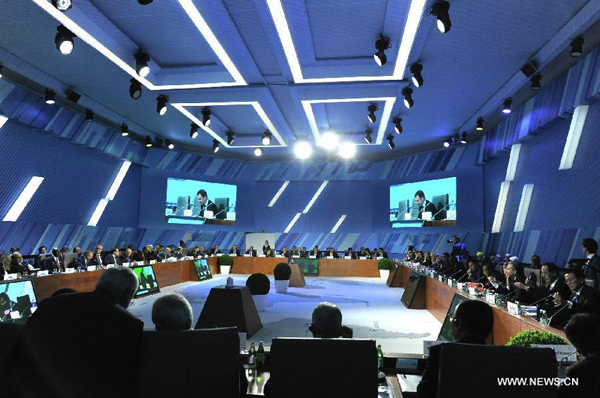G20 agrees to curb competitive currency devaluation
 0 Comment(s)
0 Comment(s) Print
Print E-mail Xinhua, February 17, 2013
E-mail Xinhua, February 17, 2013
Finance Ministers and central bankers of the Group of 20 (G20) on Saturday pledged not to target exchange rates or devalue currencies for the purpose of making them more competitive.
|
Photo taken on Feb. 16, 2013 shows the scene of the Group of 20 (G20) Meeting of Finance Ministers and Central Bank Governors in Moscow, Russia. The two-day meeting concluded here on Saturday. |
G20 members would "refrain from competitive devaluation" and " resist all forms of protectionism and keep our markets open," said the communique after the G20 finance meeting here.
It noted that monetary policy should be directed toward domestic price stability and support economic recovery.
"We commit to monitor and minimize the negative spillovers on other countries of policies implemented for domestic purposes," said the six-page document.
The communique also stressed the urgency to establish ambitious reforms and coordinated policies to achieve sustainable and balanced growth.
Speaking of Japan's recent monetary policy, a hot topic in the discussions, Pier Carlo Padoan, deputy Secretary-General and chief economist of the Organization for Economic Cooperation and Development (OECD), told Xinhua that he did not see "any implication for Japan to change its currency policy in the near future."
He suggested that efforts should be made to "mobilize long-term financing for investment as it is a key contributor to economic growth and job creation in all countries."
Russian Finance Minister Anton Siluanov said G20 finance ministers agreed that "steps of the Japanese government were so far within the common understanding of monetary policy," adding it was "an internal affair of the country."
Meanwhile, he warned against "any competitive devaluation of currencies."
"A change in the currency policy of one country will affect its trade partners. Then economic competition will be replaced with competition of currencies," Siluanov said.







Go to Forum >>0 Comment(s)